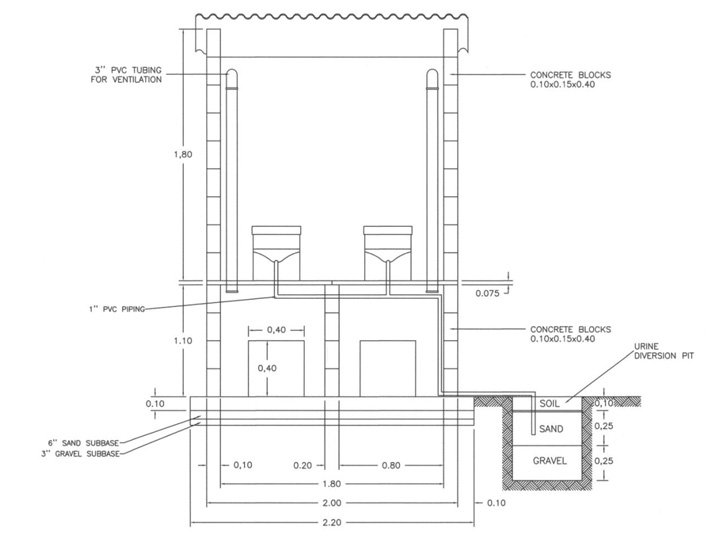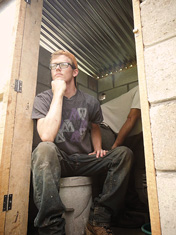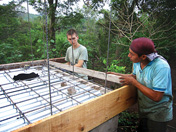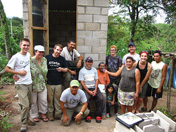Hands-on Learning Experiences for Engineering Students
- Susan J. Masten
- Professor
- Department of Civil and Environmental Engineering
- College of Engineering
MSU-Engineers Without Borders
Helps Local Organization Address Sanitation Concerns in El Salvador
In 2003 when Engineers Without Borders USA (EWB-USA) was a fledgling organization, only a year old, civil and environmental engineering professor Susan Masten invited one of its founders to present a seminar for her environmental engineering students. The concept caught on quickly, and very soon MSU had its own chapter. A Greater Lansing Professional Partners chapter was established at about the same time.
Dr. Masten was MSU-EWB's founding advisor and continues in that role today. "I wanted to get the students out of the classroom and connect them with others in need," she said, "but have it relate to their classes too."

Composting latrines solve multiple issues.
The EWB-USA model is well suited to achieving those goals. Each of its projects starts when a national or international nongovernmental organization (NGO) in the community approaches EWB-USA with an issue, such as a need for proper sanitation, access to water, or a bridge to cross a river during the rainy season.
EWB-USA accepts or rejects the application based on criteria such as community buy-in, sustainability, and cost-feasibility. If the proposal is accepted, a program is opened up to allow student or professional chapters to partner with the NGO. Only EWB-USA approved programs are eligible for partial funding and other support from the organization.

"I wanted to get the students out of the classroom and connect them with others in need, but have it relate to their classes too."
Susan J. Masten
After evaluating several projects, the MSU students decided to apply for a project to build composting latrines in El Balsamar, El Salvador, for their first international mission. They chose this project because they believed that they had the expertise to best address the needs of the community. Additionally, they felt that travel to Central America would pose fewer challenges, including funding, than the other open projects, all of which were in Africa.
The community of El Balsamar suffers from health issues associated with improper sanitation. While some families in the community have composting latrines, most have either pit latrines or no latrines at all. Pit latrines lack a drying agent, so families become more susceptible to diseases carried by flies, a problem that is exacerbated by the region's wet season. As water levels rise, the contents of pit latrines also rise, and the latrines become unusable. Fecal matter seeps into the ground, polluting the local springs that are the source of drinking, cooking, and bathing water, so waterborne illness becomes another serious health issue for the community.
Composting latrines solve many of these problems. They have a compartment to catch the waste, eliminating contact with the ground and contamination of ground water. They also continue to be usable during the wet season, and the waste may be removed and used as fertilizer. The fertilizer is very useful, as this community's main source of income is agriculture.

"I was privileged to be the student president of MSU-EWB for two years from the fall semester of 2012 to the spring semester of 2014. Through my time as president I led, assisted coordinating, and participated in local, national, and international volunteer events and projects. My time in EWB helped me learn the importance of volunteerism, especially in the efforts of international development. Among many other things, I helped rebuild homes in New Orleans, cleared hiking trails in Tennessee, and constructed composting latrines for a rural community in El Salvador. The people I met and the projects I worked on all over the nation and the world have developed in me a global perspective that has prepared me for the professional world as I move on from university. My participation in EWB has been one of the most rewarding and enriching experiences of my life."
James Rice
B.S., civil engineering
Spring 2014
"The Detroit Professional Chapter [of EWB] recognizes the dedication of the students and passion to keep their promise to the community and NGO in completing the composting latrine project. The Detroit Professionals now have ownership of the program, but it is an equally shared program with the students working heavily with design and project assessment, while the professionals work in more of a mentor capacity. The most successful student chapter projects within EWB-USA are those that have both strong faculty guidance and mentoring support from professionals. The MSU student chapter has been lucky to have both, allowing the chapter to grow in membership and implement responsible international projects with communities in need."
Esther Johnson
Mentor
Detroit Professional Chapter
EWB-USA
The MSU chapter also worked with the local agent from the Ministry of Health of El Salvador to educate people of all ages about the importance of sanitation and the benefits of composting latrines.
In 2012, after winning a grant from EWB-USA, five MSU students traveled to El Balsamar for the first time to perform an assessment. They worked with community members and the NGO Gaia El Salvador to complete a series of community-wide health surveys and design and build 30 latrines for families in the community.
The EWB-USA model requires chapters to do some of their own fundraising for these projects, so the students came home and got busy with 5K sponsorship races on campus, presentations at residence halls, and grant applications. Masten worked with them to write the grant proposals. "Altogether they raised about $11,000. We raised enough to construct six latrines," she said.
Local politics derailed their plan to go back and start work in El Salvador in 2013. "We had planned the trip, and were ready to leave, but at the last minute it was canceled due to a State Department warning," said Masten. "Not being allowed to travel was devastating to the students, the community, and the NGO with which we were working. However, the students were committed to the community and seeing the project to fruition. We had been working with the Detroit Professional Chapter of EWB and as it was apparent that the State Department warning would not be lifted soon, it made sense to transfer the project to them."
The travel ban soon proved to be only a temporary deterrent, and several students and Detroit Professional Chapter members traveled to the community in May 2014 to build their six latrines. "It was a tremendous experience for them," said Masten. "Before the students could construct anything, they had to evaluate the soil to see if it would hold the foundation and carry the runoff. All of the designs had to meet U.S. code. They were reviewed by professional engineers for volumes, ventilation, and so on. One family used their latrine as a storm shelter! It was one of the best built structures in the community."
Masten also likes the fact that both she and her students are learning about what she calls the "soft" side of engineering—things like project management, working across subdisciplines, and intercultural communication. They have to consider ethics, health and safety, economics, and community impact. "It gets me out of the silo," she said. "I have to learn about pavement, transportation, team management, all kinds of things. I believe I've become a better engineer."

Current MSU-EWB president John Suddard-Bangsund and local assistant set the formwork for a composting latrine in El Balsamar, El Salvador.

Ribbon-cutting committee of GAIA, MSU-EWB, and EWB Detroit Professional Chapter members with beneficiary family formally opens a latrine in El Balsamar, El Salvador.

EWB-USA Detroit Professional Chapter members Esther Johnson (far left) and Claire Bourseleth (far right) with members of MSU-EWB student chapter at EWB-USA National Conference in Reston, VA, November 2014.
Sources
- 1 Masten, S. J., & Haider, S. W. (2014, August). Experiences teaching a capstone design course. Paper presented at the International Conference of Engineering Education and Research, Hamilton, Ontario.
- Written by Linda Chapel Jackson, University Outreach and Engagement